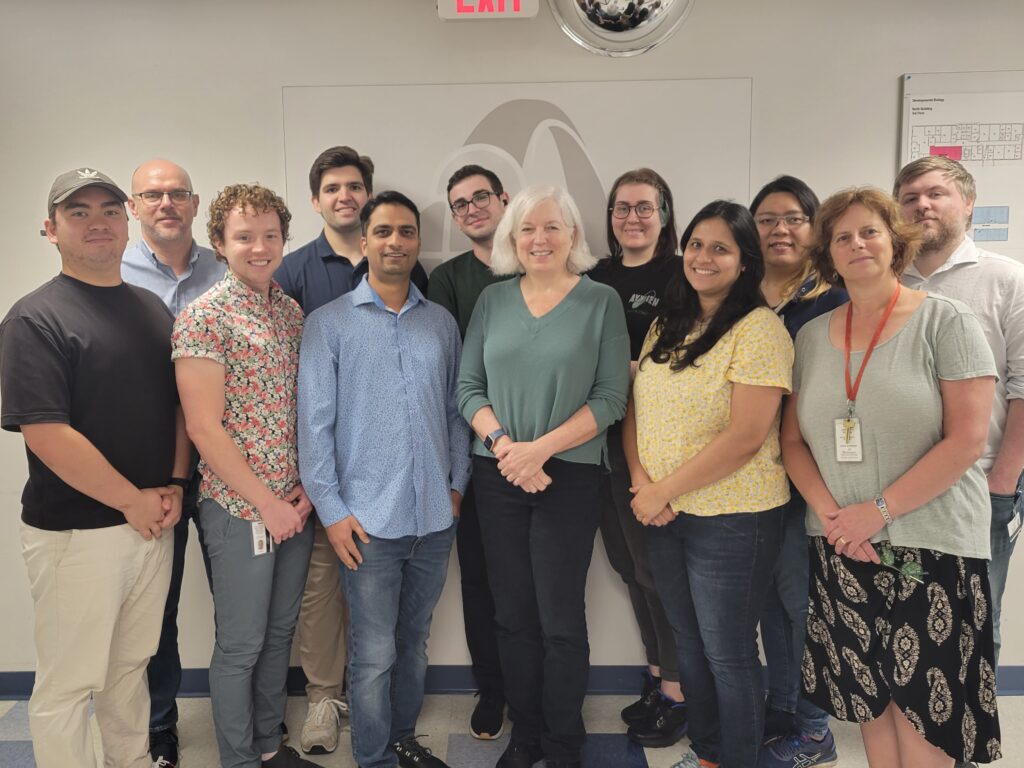
Helen McNeill, PhD
Larry J. Shapiro and Carol-Ann Uetake-Shapiro Professor
- Phone: 314-273-3050
- Email: mcneillh@nospam.wustl.edu

Research interests
The overall goal of research in the McNeill lab is to understand how tissue growth and tissue organization are coordinately regulated during normal development, and how loss of this control leads to human disease.
We investigate how these processes are regulated using both Drosophila and mouse genetics for in vivo analysis, as well as tissue culture and organoid approaches. The lab has a long tradition of investigating how Fat cadherins function in Hippo pathway-regulated growth control, planar cell polarity (PCP) tissue organization and metabolism. Fat cadherins are enormous cell adhesion molecules that bind via cadherin-cadherin interactions to another large cadherin called Dachsous (Ds). The Hippo pathway is a highly conserved signaling pathway that regulates proliferation and apoptosis via control of the activity of the transcriptional co-activators Yorkie/YAP. We use Drosophila as a genetically tractable organism to investigate the basic and conserved mechanisms of Fat function and the control of Hippo pathway activity. Our very recent work has uncovered a novel and exciting role for Fat cadherins in regeneration.
By studying Fat cadherins and the Hippo pathway in both fly and mouse models, we capitalize on each system’s strengths. We integrate biochemical studies with our genetic analysis to extend our knowledge and test our hypotheses. For example we used classical biochemical analysis to demonstrate that Fat is processed from a 560kDa precursor to a mature cell-surface receptor composed of a 110kDa transmembrane domain and a 450kDa extracellular domain composed of 34 cadherin repeats, EGF and LaminG domains that mediates binding to Ds. We showed binding of Fat to Ds promotes Fat phosphorylation and signaling to the Hippo pathway.
Now we are using proteomic screening to identify Fat cadherin pathway effectors, using BioID to identify interaction partners in a near physiological context. We also showed that Ft cadherins undergo sequential cleavages release a cytosolic fragment that is imported into mitochondria (Fat-mito), where it binds Ndufv2, a component of CI. To identify the protease involved, we will now conduct a high throughput siRNA screen to identify genes essential for the mitochondrial localization of Fat/Fat4.
Our work on Fat and the Hippo pathway in mouse models has revealed a critical and unsuspected role for the Hippo growth control pathway in morphogenesis. Using whole animal conditional and organ-culture approaches, we found that loss of NF2 or LATS or overexpression of YAP leads to growth and elongation of the collecting ducts in the absence of branching morphogenesis. To understand better how branching is affected, we will conduct high-resolution time-lapse imaging of the induction of branching morphogenesis. We will also assay tissue tension at junctions in the bud, and the trunk of developing.
In addition to our studies on Fat and the Hippo pathway, a new area of exciting research in the lab focuses on a novel nuclear protein we isolated in genetic screens that we have found is essential for chromatin structure and fertility in flies, mice and fish. This project is taking us into exploring how changes in the nuclear envelope impact gene expression and cell fate.

Education and Professional Experience
Professor, Institute of Medical Science, University of Toronto, January 2011 – present
Professor, Department of Molecular Genetics, University of Toronto, July 2010 – present
Senior Investigator, Lunenfeld-Tanenbaum Research Institute (formerly, Samuel Lunenfeld Research Institute), Sinai Health System (formerly, Mount Sinai Hospital), September 2005- present
Professor of Developmental Biology, Washington University School of Medicine, January 2018- present
Honors and Awards
2017- Fellow of the Royal Society of Canada
2016-present Canada Research Chair, Tier 1, Lunenfeld-Tanenbaum Research Institute, Toronto, Canada
2012-present – Editorial Board Member, eLife, UK
2010 – The Lloyd S.D. Folger, Award for Research Excellence
2010 – Faculty of 1000 Reviewer, Faculty of 1000 Ltd, UK
2009-2012 – Member and the Representative of Canada, North American Drosophila Board of Directors
2007-2013 – Director of Collaborative Program in Developmental Biology,
University of Toronto, Canada
2006-2007 – Petro Canada Young Innovator’s Award, Petro Canada, Canada
2007-2012 – Editorial Board Member, Developmental Dynamics, USA
1993-1996 – Postdoctoral Fellowship, American Cancer Society, USA
1991-1992 – Eloise Gerry Predoctoral Fellowship, Stanford University, USA
1991 – Katherine McCormick Fellowship, Stanford University, School of Medicine, USA
1990 – Woods Hole Summer Student Tuition Scholarship, Marine Biology Laboratories, USA
1985 – President’s List, Ramapo College, USA
1985 – Women’s Leader Award, Ramapo College, USA
1985 – Fellowship in Biomedical Research, New York Medical College, USA
1982-1985 – Dean’s List, Ramapo College, USA
Selected publications
- McNeill H, Reginensi A. Lats1/2 Regulate Yap/Taz to Control Nephron Progenitor Epithelialization and Inhibit Myofibroblast Formation. (2017) J Am Soc Nephrol, 28, 852-861.
- Yeung K, Boija A, Karlsson E, Holmqvist P-H, Tsatskis Y, Nisoli I, Yap D, Lorzadeh A, Moksa M, Hirst M, Aparicio S, Fanto M, Stenberg P, Mannervik M, McNeill H. Atrophin controls developmental signaling pathways via interactions with Trithorax-like. (2017) eLife, Mar 22;6. pii: e23084. doi: 10.1681/ASN.2016060611..
- Reginensi A, Enderle L, Gregorieff A, Johnson RL, Wrana JL, McNeill H. A critical role for NF2 and the Hippo pathway in branching morphogenesis. (2016) Nat Commun, 7, 12309.
- Badouel C, Zander MA, Liscio N, Bagherie-Lachidan M, Sopko R, Coyaud E, Raught B, Miller FD, McNeill H. Fat1 interacts with Fat4 to regulate neural tube closure, neural progenitor proliferation and apical constriction during mouse brain development. (2015). Development, 142, 2787-91.
- Reginensi A, Hoshi M, Boualia SK, Bouchard M, Jain S, McNeill H. Yap and Taz are Required for Ret-Dependent Urinary Tract Morphogenesis. (2015) Development, 142, 2696-703.
- Bagherie-Lachidan M, Reginensi A, Pan Q, Zaveri HP, Scott DA, Blencowe BJ, Helmbacher F, McNeill H. Stromal Fat4 acts non-autonomously with Dchs1/2 to restrict the nephron progenitor pool. (2015) Development, 142, 2564-73.
- Sing A, Tsatskis Y, Fabian L, Bietenhader M, Stolz T, Rosenfeld R, Brill J, McQuibban GA, McNeill H. The atypical cadherin Fat directly regulates mitochondrial function and metabolic state. (2014) Cell, 158, 1293-1308.
- Cappello S, Gray MJ, Badouel C, Lange S, Einsiedler M, Srour M, Chitayat D, Hamdan FF, Jenkins ZA, Morgan T, Preitner N, Uster T, Thomas J , Shannon P, Morrison V, Di Donato N, Van Maldergem L, Neuhann T, Newbury-Ecob R, Swinkells M, Terhal P, Wilson LC, Zwijnenburg PJG, Sutherland-Smith AJ, Black MA, Markie D, Michaud JL, Simpson MA, Mansour S, McNeill H, Götz M, Robertson SP. Mutations in genes encoding the cadherin receptor-ligand pair DCHS1 and FAT4 disrupt cerebral cortical development (2013) Nature Genetics, 45, 1300-8.
- Sharma PP, McNeill H. Regulation of long-range planar cell polarity by Fat-Dachsous signaling. (2013) Development, 140, 3869-81.
- Reginensi R, Scott R, Gregorieff A, Bagherie-Lachidan M, Chung C, Lim D-S, Pawson T, Wrana J, McNeill H. Yap- and Cdc42-Dependent nephrogenesis and morphogenesis during Mouse Kidney Development. (2013) PLoS Genetics, 9, e1003380.
- Saburi S, Hester I, Goodrich L, McNeill H. Functional interactions between Fat-family cadherins in tissue morphogenesis and planar polarity. (2012) Development, 139, 1806-20.
- Sopko R, Silva E, Clayton L, Gardano L, Barrios-Rodiles M, Wrana J, Varelas X, Arbouzova NI, Shaw S, Saburi S, Matakatsu H, Blair S, McNeill H. Phosphorylation of the tumor suppressor fat is regulated by its ligand Dachsous and the kinase discs overgrown. (2009) Current Biology, 19, 1112-7.
- Badouel C, Gardano L, Amin N, Garg, A, Le Bahn T, McNeill H. The FERM-domain protein Expanded regulates Hippo pathway activity via direct interactions with the transcriptional activator Yorkie. (2009) Developmental Cell, 16, 411-20
- Amin N, Khan A, St Johnston D, Tomlinson T, Martin S, Brenman J, McNeill H. LKB1 regulates cell polarity and adherens junction formation in the Drosophila retina. (2009) Proc Natl Acad Sci, 106, 8941-6.
- McNeill H, Craig GM, Bateman JM. Regulation of Neurogenesis and EGFR signaling by the insulin receptor/TOR pathway. (2008) Genetics, 179, 1-11.
- Saburi S, Hester I, Fischer E, Pontoglio M, Eremina V, Gessler M, Quaggin S, Harrison R, Mount R, McNeill H. Loss of Fat4 disrupts PCP signalling and oriented cell division, leading to cystic kidney disease. (2008) Nature Genetics, 40, 1010-5.
- Silva E, Tsatskis Y, Gardano L, Tapon N, McNeill H. The tumour suppressor gene fat controls tissue growth upstream of Expanded in the Hippo signalling pathway. (2006) Current Biology, 7, 2081-2089.
- Bilioni A, Craig G, Hill C, McNeill H. Iroquois transcription factors recognize a unique motif to mediate transcriptional repression in vivo. (2005) Proc Natl Acad Sci, 102, 14671-14676.
- Bateman JM, McNeill H. Temporal control of differentiation by the insulin receptor/Tor pathway in Drosophila. (2004) Cell, 119, 87-96.
- Fanto M, Clayton L, Meredith J, Hardiman K, Charroux B, Kerridge S, McNeill H. The tumor-suppressor and cell adhesion molecule Fat controls planar polarity via physical interactions with Atrophin, a transcriptional co-repressor. (2003) Development, 130, 763-774.